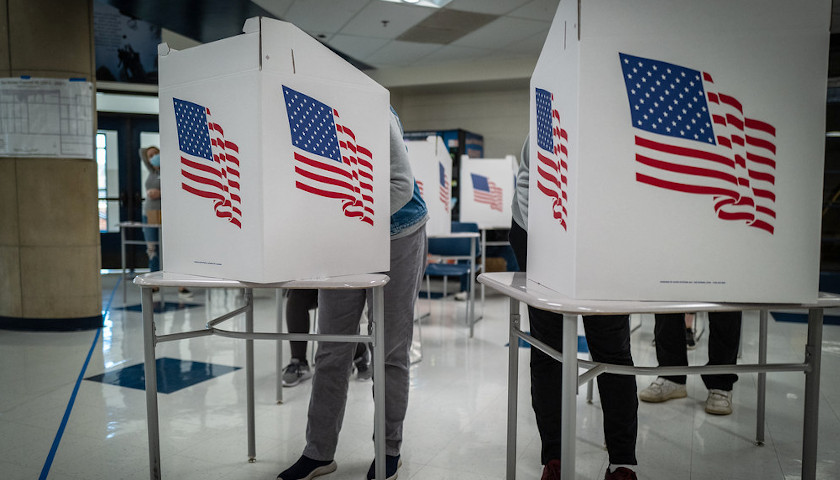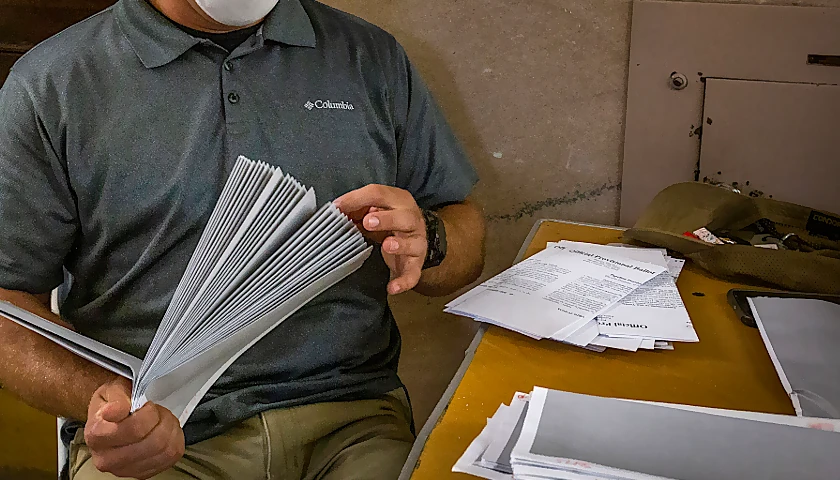As in-person early voting began Monday for the January 5 run off election for two U.S. Senate seats in Georgia, significant changes for absentee ballot signature verification and drop boxes put into place by Secretary of State Brad Raffensperger and the State Election Board ahead of the November 3 presidential election without the state legislature’s approval are still in place.
Local county registrars began mailing approved absentee ballots to voters for the January 5 run off elections more than three weeks ago on November 18, according to Georgia’s election calendar.
Neither (1) the use of drop boxes for voters to deposit absentee ballots nor (2) the current method of absentee ballot signature verification have been authorized by the Georgia General Assembly.
(1) The use of drop boxes for voters to deposit absentee ballots has not been authorized by the Georgia General Assembly
Mail or personal delivery are the only two ways that Georgia lawmakers have clearly specified in O.C.G.A. 21-2-385 that electors are to get their absentee ballots to the registrar or absentee ballot clerk.
There are no provisions in the current Georgia code made by state legislators – who have the sole constitutional responsibility for setting election procedures as stated in Article II Section I, Paragraph I of the Constitution of the State of Georgia – for drop boxes or any other manner in which absentee ballots can be returned to the registrar other than mail or in-person delivery.
O.C.G.A. 21-2-382 explicitly addresses “Additional sites as additional registrar’s office or place of registration for absentee ballots.”
That section of Georgia law allows for the registrar to establish additional sites “for the purpose of receiving absentee ballots.”
The law specifies that any additional sites must be “a branch of the county courthouse, a courthouse annex, a government service center providing general government services, another government building generally accessible to the public.” The law extends the establishment of additional sites by the registrar to locations used as an election day polling place, even if that location is not a government building.
Shortly after Gov. Kemp declared a public health emergency due to the COVID-19 pandemic, and in advance of the June primary, Secretary Raffensperger and the State Election Board voted unanimously at their April 15, 2020 special-called meeting to adopt Election Code Emergency Rule number 183-1-14-0.8-.14. to Secure Absentee Ballot Drop Boxes “exactly as written” and presented to the board at the meeting by Secretary of State General Counsel Ryan Germany:
V. EMERGENCY RULE: SECURE ABSENTEE BALOT (sic) DROP BOXES
Mr. Germany presented and explained the emergency rule to the Board and asked the Board to adopt the rule as written. Matthew Mashburn made a motion to adopt the emergency rule as written. David Worley seconded the motion. The motion carried unanimously with a Board vote of 4-0.
Under Georgia law, emergency rules adopted by any state agency or regulatory body automatically expire 120 days after their adoption(see § 50-13-4-b).
Subsequently, the State Election Board met on July 1 and unanimously voted to amend and extend Election Code Emergency Rule number 183-1-14-0.8-.14. for an additional 120 days, meaning the rule was set to expire on October 28, five days before the November 3 general election:
Mr. Germany presented and explained the proposed amended emergency rules to the Board and asked the Board to adopt the rules. The Board unanimously voted to adopt the amendments to the emergency rules as written.
A subsequent review of the agenda and meeting summaries of all the meetings of the State Election Board between July 1, 2020 and Election Day November 3, 2020 by The Georgia Star News indicates that the Board appears to not have undertaken consideration of or a vote on extending Election Code Emergency Rule number 183-13-0.8-14. subsequent to its apparent expiration on October 28, 2020.
On November 23, the State Election Board met again and, according to press reports, voted unanimously to extend Election Code Emergency Rule number 183-13-0.8-14. A written transcript of the minutes of that meeting has not been made available at the State Election Board website, but you can listen to an audio recording of that one hour and 27 minute meeting here.
The rule usurps Georgia’s legislature by giving powers to county registrars not permitted in state law.
The first paragraph of the Raffensperger/State Election Board rule reads, “County registrars are authorized to establish one or more drop box locations as a means for absentee by mail electors to deliver their ballots to the county registrars.”
(2) The current method of absentee ballot signature verification has not been authorized by the Georgia General Assembly
Another change to absentee ballot procedures instituted by Raffensperger and the State Election Board without legislative approval came about as the result of a November 2019 lawsuit brought by the Democratic Party of Georgia (DPG) against Raffensperger, the State Election Board, and the Gwinnett County Board of Registration and Elections.
DPG’s legal complaint centered on a few points relative to absentee ballots:
– when a timely-submitted absentee ballot is rejected by the registrar for signature issues in accordance with O.C.G.A. 21-2-386, the “promptly notify” provision of the statute does not adequately address the method or timing of such notification by the registrar to the absentee voter
– the Gwinnett County absentee ballot envelope has a confusing layout and illegible font size, caused primarily by the federally mandated English/Spanish bi-lingual verbiage to accommodate the high percentage of Hispanic and Latino residents of the county
The remedy that DPG sought from the U.S. District Court for the Northern District of Georgia was two-fold:
– require that the Georgia Secretary of State and the State Election Board instruct county election officials to notify voters of signature issues with their absentee ballots by phone, email and/or text message within one day of receiving the absentee ballot
– prevent the Gwinnett Board from creating, preparing and distributing absentee ballot envelopes with a confusing, illegible design
Since DPG’s requests seem fairly reasonable and straightforward, it is unclear why Raffensperger went above and beyond the requested relief by agreeing to the March 2020 Compromise Settlement Agreement and Release.
In the Compromise Settlement, Raffensperger and the State Election Board agreed and subsequently changed Rule 183-1-14-.13 regarding Prompt Notification of Absentee Ballot Rejection.
The Compromise Settlement also required that Raffensperger, “in his official capacity as Secretary of State,” issue an Official Election Bulletin regarding the procedure for reviewing signatures on absentee ballot envelopes by county election officials.
Raffensperger’s subsequent Official Election Bulletin required that county registrars and absentee ballot clerks comparing signatures on the absentee ballot mailing envelope to the voter’s registration card seek review from two other registrars before rejecting the ballot. An absentee ballot could not be rejected unless a majority of the three registrars agreed that the signature does not match any of the voter’s signatures on file.
The review and agreement by two other registrars materially changed Georgia law, as set out in O.C.G.A. 21-2-386(a)(1)(C), which requires review by only one individual and makes it more difficult to challenge defective signatures.
It is also curious that this mandate comes by way of an Official Election Bulletin from Raffensperger, rather than a rule change approved by the State Election Board, which is done through public meetings, adoption through a majority vote and publication of the meeting minutes and the rules.
By comparison, Official Election Bulletins do not get the public hearing that State Election Board Rules do, and the Secretary of State’s website includes no obvious record of the Official Election Bulletins that Raffensperger has issued.
Clearly, that is not the case when it comes to requiring signature review on the absentee ballot exterior envelope by three individuals and majority agreement before a rejection, when the law calls for review and rejection by only the registrar or clerk.
In August 2020, Raffensperger and the State Election Board went further to undermine the signature verification process.
Through Emergency Rule 183-1-14-0.10-.16 Raffensperger and the State Election Board allowed applications for absentee ballots to be submitted on-line. As such, there was no requirement for the direct presentation of the applicant’s signature for verification and issuance of an absentee ballot.
Raffensperger also agreed in paragraph 4 of the Compromise Settlement to “consider in good faith providing county registrars and absentee ballot clerks with additional guidance and training materials to follow when comparing voters’ signatures that will be drafted by the Political Party Committees’ handwriting and signature review expert.”
The “Political Party Committees,” as defined in the Compromise Settlement are the Democratic Party of Georgia and two other Democratic organizations.
Shockingly, this leaves the training for absentee ballot signatures to Democrat experts.
Under the auspices of protecting the health of Georgia voters while “also upholding the integrity of the vote,” Raffensperger, “more than ever,” encouraged Georgians to vote with a mail-in absentee ballot
To assist in that goal, Raffensperger mailed 6.9 million absentee ballot request forms to every Georgia voter, according to a statement issued by the Secretary of State’s office.
This, while the DPG who named him in the lawsuit, said in their legal complaint that in recent elections, “absentee voters have disproportionately voted for Democratic candidates.”
The November 3, 2020, presidential election results certified by Raffensperger and Governor Brian Kemp had Democratic candidate Joe Biden ahead of President Donald Trump by less than 12,000 votes out of 5 million votes cast, of which 1.3 million were fraud-prone absentee ballots.
The state of Texas alleged in a lawsuit, filed with the U.S. Supreme Court and supported by 18 Republican attorneys general, that Georgia Secretary of State Brad Raffensperger materially changed the absentee ballot signature verification process in the months leading up to the November 3, 2020 general election. The Supreme Court rejected the lawsuit, not on merit, but for Texas’s lack of standing under Article III of the Constitution.
—
Laura Baigert is a senior reporter at The Tennessee Star and The Star News Network.
Photo “People Voting” by Phil Roeder. CC BY 2.0.






One thing that we have seen concerning the recent Presidential election fraud controversy, in ‘swing’ States which have Republican legislatures (which is almost all of them, except Nevada) but Dem Governors, there has been a problem with these Dem Governors refusing to call a Special Session of the State Legislature to address imminent election fraud/Electoral College problems. In fact, in these States the State Legislature (which under the U. S. Constitution must act quickly within a very brief time-frame) is not even meeting (maybe individual committees or joint committees are meeting, but not the entire legislature). Tennessee should act pre-emptively to address this potential problem. There should be the necessary authority, and procedures, for the Tennessee Legislature to quickly call itself into Special Session if it thinks it needs to do so. In our State, the Tennessee General Assembly is very ‘strong;’ I think that this is the way that it should be. I think that the Tennessee General Assembly must see to it that it is not ‘hamstrung’ when it needs to act quickly but is meeting severe political opposition to the contrary.
The truth really does not matter unless judges grow the guts to take on the cases.
Really, people? This is OLD news.
you missed your appointment again.
I guess no one seem to learn anything from the cluster you know what from the general election regarding drop boxes and absentee ballots.
How many claims will be made this time regarding voting fraud?
Amazing finding. Thankyou Brothers & Sisters!
The rule of law is dead. Prepare for war. The writing is on the walls. The love of money is the root of all evil. Politicians are mostly self serving psychopaths.
Crooked and illegal as hell, I hope they all go to jail. Maybe we could send them Commie Cooper and his comrades to help with any lawsuits that follow. Maybe TSU can spare that brilliant professor, Al (the race baiter) Sharpton. They all should share a cell at Gitmo, nice and cozy.